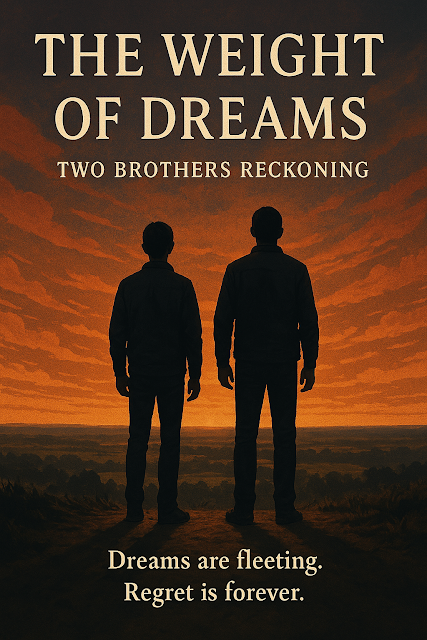By Emeka Chiaghanam
The air in their childhood home was thick with unsaid things. Daniel’s textbooks lay stacked like fortifications on his desk, while Mark’s guitar leaned against the wall, its strings humming with restless energy. Two brothers, one house, two different worlds.
Daniel moved through life with
methodical precision, homework done by dusk, chores completed without reminder,
a future mapped in spreadsheets and scholarships. Mark? He lived in the spaces
between. His dreams were wild, untamed things: lyrics scribbled on napkins,
melodies hummed into the quiet of night, a hunger for something more than
their sleepy town could offer.
Their rivalry wasn’t born of
hatred, but of fear. Fear of being left behind. Fear of not being enough.
"Why can’t you just let me
be?" Mark’s voice cracked like a whip across the dinner
table. The words hung there, sharp and accusing. Daniel didn’t flinch. He never
did.
"Because I see you,"
Daniel said quietly. "And you’re better than this."
This. The
late-night parties, the skipped classes, the half-finished songs abandoned when
the chords didn’t come easy. Mark’s hands clenched. "You don’t get to
decide what ‘better’ is."
The silence after was
deafening.
The talent show was supposed to
be Mark’s redemption. His moment. The stage lights burned hot,
the crowd a blur of expectant faces. His fingers found the strings, and for
three minutes, he was untouchable. The music poured out of him, raw, aching,
alive.
Then Daniel took the stage.
No guitar, no grand gestures.
Just a piano, and a quiet intensity that stole the oxygen from the room. His
song wasn’t fireworks; it was a slow burn, a confession. By the final note,
even Mark’s anger flickered.
The judges’ verdict was a gut
punch.
Daniel.
Applause roared. Mark’s vision
tunneled. He was halfway to the parking lot before he realized he was running.
The hospital smelled like
antiseptic and dread. Machines beeped in cruel, rhythmic taunts. Daniel’s face
was pale against the sterile sheets, his hands, those careful, piano-calloused
hands; motionless.
Mark’s knees hit the
linoleum. This isn’t happening.
But it was. The accident had
been quick. A patch of ice, a skid, metal screaming against asphalt. Now
Daniel’s future, the scholarship, the conservatory, the life he’d built note by
note, was gone.
And Mark? He was drowning in
the aftershocks of his own resentment.
"Play for me," Daniel
whispered one evening, his voice frayed at the edges.
Mark hesitated. The guitar felt
foreign now, weighted with guilt. But he played. A song they’d written together
years ago, back when ambition hadn’t yet sharpened into competition.
Daniel’s eyelids fluttered
shut. A tear slipped free.
It was the last time they’d
share music.
Grief is a cruel teacher. It
strips you bare, forces you to sift through the wreckage of what you’ve lost.
At the funeral, Mark stood numb, the weight of his brother’s absence crushing.
The trophy, the scholarship, the rivalry, none of it mattered now.
Only this: the silence where
Daniel’s laughter should’ve been.
What do we sacrifice in the
name of ambition?
Time. Love. The people who
matter most.
Mark sits at the piano now,
fingers hovering over the keys. The melody comes haltingly, a lament for what
was and what could’ve been. He doesn’t play for crowds anymore. He plays for
the ghost of a brother who believed in him even when he didn’t believe in
himself.
The lesson is carved into his
bones now: Dreams are fleeting. Regret is forever.
So tell me, who are you racing
against? And what will you lose if you win?


Post a Comment